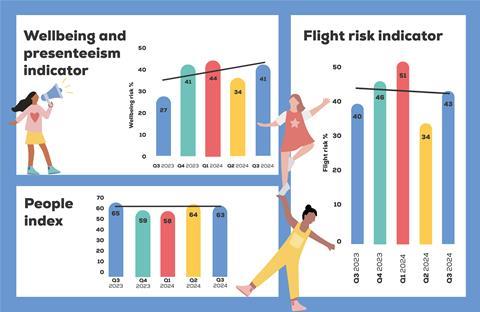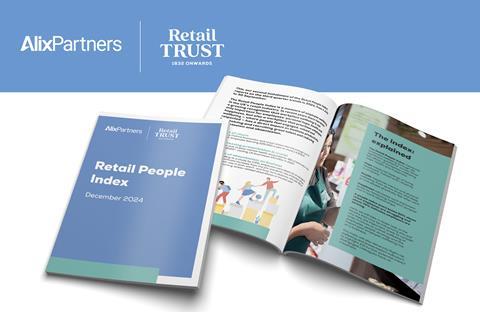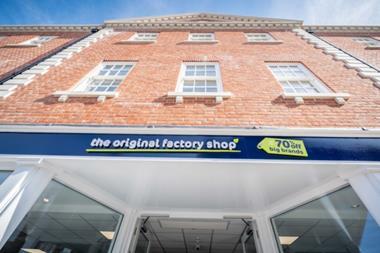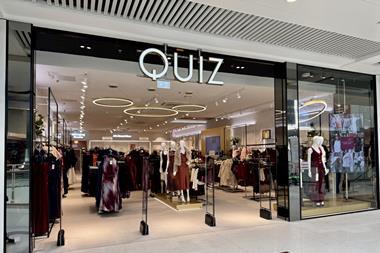Following the launch of the Retail People Index, Retail Trust chief executive Chris Brook-Carter discusses how the findings show the essential link between workforce wellbeing and a sustainable future for retail
When it comes to ensuring a sustainable and productive future for the UK’s retail industry, new technology, net zero goals and market expansion are often what first come to mind.
But if there’s one thing that nearly 200 years of the Retail Trust has shown us, it’s that the sector has no future at all unless we prioritise the wellbeing of its more than 3 million people.
This understanding has been at the heart of the Retail Trust’s purpose ever since we were established as a charity for the industry’s workforce in 1832. And it’s what led us to launch our new quarterly Retail People Index with AlixPartners this year, to better track the sector’s changing wellbeing trends.
Better responding to the needs of colleagues
The Retail People Index is compiled in partnership with our data provider WorkL, who has helped us collect thousands of responses from UK retail employees over the last year on the issues that are affecting rates of wellbeing, flight risk and presenteeism. This has allowed us to create a regular wellbeing barometer so that we in the industry can better respond to the needs of our colleagues.

The initial findings have been stark, and they have deepened over time. Our first index in July this year showed that nearly half of workers were at risk of leaving their roles or working while unwell in the wake of the busy Christmas season, something retailers must take into account this winter.
Older female colleagues aged between 55-64 experienced some of the steepest declines in overall wellbeing over the summer
Our latest findings paint a similarly troubling picture during what is often perceived as the sector’s quieter summer months. More than two in five employees were again at risk of leaving the sector or working while unwell between July and September this year, with younger workers and those from the LGBTQ+ community most impacted. At the same time, female colleagues aged between 55 and 64 experienced some of the steepest declines in overall wellbeing over the summer.
These troubling wellbeing trends come at a time when the sector is under extraordinary pressure, with increases in the national living wage and national insurance, unpredictable consumer confidence and the much called-for but still outstanding business rates reform.
Poor mental health costs UK employers more than £50bn a year
Amidst all this, focusing on retail workers’ mental health and sense of purpose might sometimes feel like a ‘nice to have’. But it’s actually non-negotiable if we want resilient businesses capable of handling the challenges facing the sector. After all, businesses can only ever be as innovative, productive and sustainable as the people who power them.
The link between employee wellbeing and productivity is becoming increasingly documented. Research has found poor mental health costs UK employers more than £50bn a year, while the average cost to replace a departing employee earning £25,000 a year or more is £30,614.
This is, therefore, about more than just doing the right thing morally. A thriving workforce is more creative, more engaged and more agile; the attributes retailers need to keep pace with the rapid changes in consumer behaviour, technology and government policy. Staff who feel supported and recognised are better equipped to serve customers, drive innovation, and adapt to these new challenges.
Businesses can only ever be as innovative, productive and sustainable as the people who power them
The stakes are perhaps highest for younger workers. Retail has a long and proud tradition of nurturing talent from the shop floor up, with many of today’s retail leaders having started there. Yet our index shows younger employees now often feel anxious, undervalued and insufficiently supported. At the same time, we risk losing the industry’s most experienced workers due to the wellbeing challenges now facing our older colleagues.
Looking beyond profit margins and performance to invest in staff happiness
So, what should retail’s response look like? It means investing in robust mental health measures including training and counselling.
It means developing more inclusive workplaces where employees feel valued and see a future in the industry. It means addressing issues like in-work poverty and the rising tide of retail worker abuse that directly undermines morale and retention.
And it means fully understanding these evolving trends and tailoring wellbeing strategies as a result, using tools such as the Retail People Index and the Retail Trust’s generative AI-powered happiness dashboard.
It’s right that the industry is focused on the latest tech trends, the best environmental standards and the next big market opportunities. But as we look towards a greener and more digital retail ecosystem, we must not lose sight of the essential foundation upon which all those ambitions rest: the people who will bring them to life.
We’ve created the Retail People Index to help retail employers look beyond profit margins and performance metrics and also really consider what the hope, health and happiness of their people means for both their workforces and businesses. In doing so, they can help to ensure a more economically, environmentally and emotionally sustainable retail industry well into the future.

Download the Retail Trust and AlixPartners’ Retail People Index here.

Chris Brook-Carter is chief executive of The Retail Trust





























